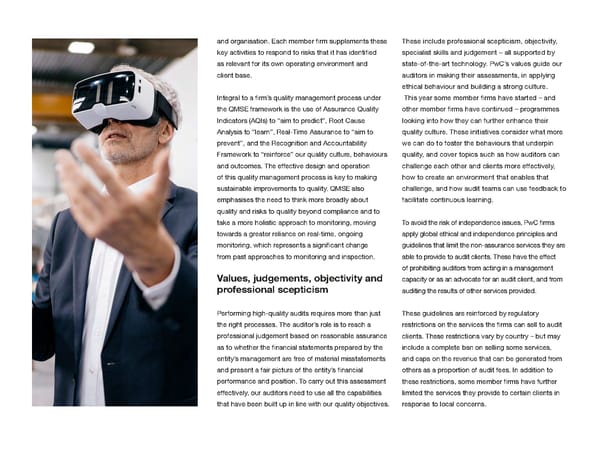and organisation. Each member ifrm supplements these These include professional scepticism, objectivity, key activities to respond to risks that it has identiifed specialist skills and judgement – all supported by as relevant for its own operating environment and state-of-the-art technology. PwC’s values guide our client base. auditors in making their assessments, in applying ethical behaviour and building a str ong culture. Integral to a ifrm’s quality management process under This year some member ifrms have started – and the QMSE framework is the use of Assurance Quality other member ifrms have continued – programmes Indicators (AQIs) to “aim to predict”, Root Cause looking into how they can further enhance their Analysis to “learn”, Real-Time Assurance to “aim to quality culture. These initiatives consider what more prevent”, and the Recognition and Accountability we can do to foster the behaviours that underpin Framework to “reinforce” our quality culture, behaviours quality, and cover topics such as how auditors can and outcomes. The effective design and operation challenge each other and clients more effectively, of this quality management process is key to making how to create an environment that enables that sustainable improvements to quality. QMSE also challenge, and how audit teams can use feedback to emphasises the need to think more broadly about facilitate continuous learning. quality and risks to quality beyond compliance and to take a more holistic approach to monitoring, moving To avoid the risk of independence issues, PwC ifrms towards a greater reliance on real-time, ongoing apply global ethical and independence principles and monitoring, which represents a signiifcant change e guidelines that limit the non-assurance services they ar from past approaches to monitoring and inspection. able to provide to audit clients. These have the effect of prohibiting auditors from acting in a management Values, judgements, objectivity and om capacity or as an advocate for an audit client, and fr professional scepticism auditing the results of other services provided. Performing high-quality audits requires more than just These guidelines are reinforced by regulatory the right processes. The auditor’s role is to reach a restrictions on the services the ifrms can sell to audit professional judgement based on reasonable assurance clients. These restrictions vary by country – but may as to whether the ifnancial statements prepared by the include a complete ban on selling some services, entity’s management are free of material misstatements and caps on the revenue that can be generated from and present a fair picture of the entity’s ifnancial others as a proportion of audit fees. In addition to performance and position. To carry out this assessment these restrictions, some member ifrms have further effectively, our auditors need to use all the capabilities limited the services they provide to certain clients in that have been built up in line with our quality objectives. response to local concerns.
 Global Annual Review | PwC Page 61 Page 63
Global Annual Review | PwC Page 61 Page 63